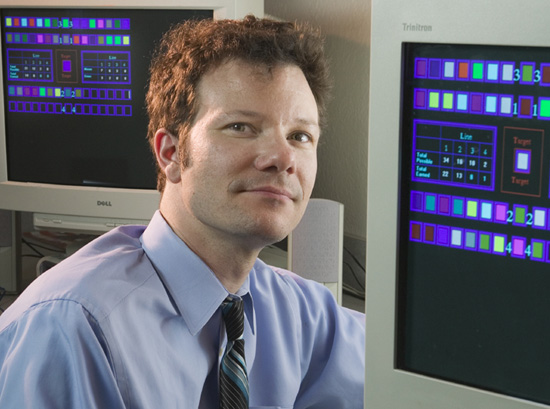Assistant Professor Expert on Schizophrenia, Neurocognition
 |
| Matthew Kurtz, assistant professor of psychology, teaches behavioral neurobiology. |
| Posted 09/19/07 |
| Matthew Kurtz has joined the Psychology Department as an assistant professor.
Kurtzs research focus is on developing cognitive and social-cognitive training programs for improving neurocognitive and psychosocial function in patients with schizophrenia. Hes interested in implementing functional brain imaging probes, neuropsychological tests and real-world employment outcomes as measures of change. Hes co-teaching Behavioral Neurobiology this fall. Kurtz comes to Wesleyan from The Neuropsychiatry Research Center, part of the Institute of Living in Hartford where he was a research scientist. There, he studied neurocognition, brain imaging and rehabilitation in schizophrenia. He continues his appointment as an assistant clinical professor of Psychiatry at the Yale School of Medicine. Kurtz was a visiting assistant professor of psychology at Wesleyan during spring semester 2005, and spring semester 2007. These positions gave Kurtz a first-hand experience with the intellectual curiosity, motivation and open-mindedness characteristic of so much of the Wesleyan student body, he says. Wesleyans reputation as both a top-notch scholarly institution, coupled with its emphasis on instruction appeared to make it an ideal fit for me, he says. Kurtz obtained a bachelor of science in psychology at Reed College, and a master of science and Ph.D in psychology from Princeton University. Subsequently, he received training in the applied field of clinical neuropsychology, learning assessment and intervention techniques for a variety of brain disorders, resulting in a certificate in this field through the City University of New York, as well as licensure in Connecticut as a psychologist. Most recently, he completed a National Institute of Mental Health post-doctoral fellowship in neuropsychiatric aspects of schizophrenia at the University of Pennsylvania. In 2005, he was awarded a NIMH Mentored Clinical Scientist Development Award for research on Neurocognitive rehabilitation for schizophrenia. He will continue NIH-funded research at Wesleyan. The resources Wesleyan has made available to move our NIH-funded work forward are exquisite, Kurtz says. Kurtz is the author or co-author of more than 20 published articles, most recently, “Neurocognitive remediation for schizophrenia: A review of recent advances, published in Current Psychiatry Reviews, in press; A virtual-reality apartment as a measure of medication management skills in patients with schizophrenia: A pilot study, published in Schizophrenia Bulletin, in press; and Computer-assisted cognitive remediation in schizophrenia: What is the active ingredient? published in Schizophrenia Research, 2007. In addition, he is a member of the International Neuropsychological Society, Connecticut Neuropsychological Society and the American Psychological Association. Kurtz enjoys traveling, listening to jazz and post-punk music, and reading poetry and non-fiction. He resides in West Hartford. |
| By Olivia Drake, The Wesleyan Connection editor. Photo contributed. |

